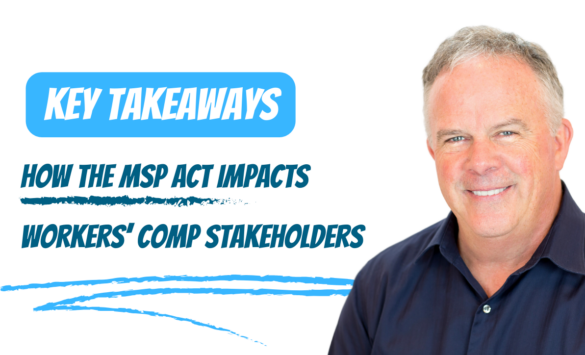Let’s take a moment to look at an example of a workers’ compensation claim. You have an injured worker who has failed back surgery, they applied and were awarded SSDI benefits over two years ago, and they are now receiving Medicare benefits. The vocational rehabilitation counselor was unable to find alternative work. The injured worker has expressed interest in resolving their case, including future medical. How do the settling parties reasonably consider Medicare’s interest in resolving this case? We will walk you through the steps in this article.
First, it’s important to understand when Medicare is a Secondary Payer. In the case of workers’ compensation when a claim is accepted as compensable, workers’ compensation becomes the primary payer. These provisions protect the Medicare Trust Fund by ensuring Medicare doesn’t pay for services when there is a primary payer, such as workers’ compensation.
Medicare has increased its enforcement and recovery efforts over the years to preserve the Medicare trust fund. Part A, Hospitalization coverage, is currently projected to go insolvent by 2028. As good corporate stewards, we can do our part in preserving the Medicare trust fund by adhering to the Medicare Secondary Payer Act (MSP Act).
There are three main areas of Medicare compliance: Section 111 Reporting responsibilities, Conditional Payments, and Medicare Set Asides (MSAs).
We will begin with Sectional 111 Reporting. In the case above, the primary payer has a duty to file Ongoing Responsibility of Medical (ORM) reporting when the injured worker becomes a Medicare beneficiary, and the claim is accepted and meets the $750 threshold. The payor also has a duty to file a Total Payment Obligation to the Claimant (TPOC) when the claim is settled, which includes the release of future medical. Think of Section 111 Reporting as Medicare’s radar to identify potential conditional payments and coordinate benefits. The Benefits Coordination and Recovery Center posts Section 111 data to the Common Working File used by medical providers to determine primary coverage.
Key Takeaways
The Centers for Medicare and Medicaid Services (CMS) expects primary payers to report timely and accurately.
It’s anticipated that CMS will issue a Final Rule imposing Civil Money Penalty up to $1,000 per day of noncompliance for each individual for Section 111 reporting noncompliance. This is expected to be released in February 2024. CMS encourages payors to review their Section 111 programs to ensure timely and accurate reporting.
Next, we will address traditional conditional payments (Part A – Hospitalization & Part B – Physician services). Medicare is prohibited from making payment “to the extent that payment has been made or can reasonably be expected to be made” by a workers’ compensation law or plan. Medicare uses contractors to facilitate conditional payment recovery and benefit coordination. Medicare Part C and Part D plans also have a right of recovery through the private cause of action (see 42 U.S.C. 1395y(b)(3)(A)).
There are two Medicare contractors that pursue conditional payments: The Benefits Coordination and Recovery Center (BCRC) and the Commercial Recovery Center (CRC). The BCRC collects and compiles information about beneficiaries’ other health coverage and recovers conditional payments where beneficiaries have received payments from primary payers (e.g., settlements, judgments, awards). BCRC recoveries are associated with Sec. 111 TPOC filings and what is released in the settlement. If the settlement releases denied body parts, BCRC may pursue recovery.
The CRC recovers conditional payments from workers’ compensation carriers associated with Ongoing Responsibility of Medical (ORM) on injuries and conditions that are accepted. Important to note that this can be a continuous recovery through the life of the claim, and you may receive multiple demands. The filing of ORM will generate a Conditional Payment Notice (CPN). The CPN provides conditional payment information. It advises the applicable plan that certain actions must be taken within 30 days of the date on the CPN, or the CRC will automatically issue a demand letter.
In the example of the back injury, the workers’ compensation carrier would report ORM that triggers a review of conditional payments once the injured worker becomes eligible for Medicare. Let’s say conditional payments exist in the claim, the adjuster reviewed and determined the treatment was work related and reimbursed CRC. Now a month later, the claim settles, and the carrier files the TPOC. BCRC will do a final sweep to see if there are any additional conditional payments. It’s important to note that the workers’ compensation carrier is considered the debtor when the claim is accepted and ORM is filed. When the case settles, the injured worker becomes the debtor, and the carrier will no longer receive conditional payment letters without signed authorization from the injured worker. When a carrier takes responsibility for conditional payments post-settlement, they will need signed authorization (Proof of Representation) from the injured worker to have two-way communication with BCRC and negotiate the debt. The carrier should also include injured worker cooperation language to dispute any unrelated debt.
Key Takeaways
Primary payors, or Responsible Reporting Entities, must ensure accurate Section 111 Reporting of injuries that can lead to conditional payment letters.
If the carrier agrees to pay related conditional payments after settlement, they will need a signed authorization from the injured worker. Without the authorization, the primary payer may never be aware of the debt’s existence because the correspondence will only be sent to the injured worker, which can lead to interest and potential Department of Treasury Offset against the primary payer.
Finally, we have Medicare Set Asides (MSAs). 42 U.S.C. 1395y(b)(2), prohibits Medicare from paying claims that should be paid by another responsible party. Medicare’s interests must be considered and adequately protected in any settlement which forecloses future medical expenses.
In the example of the back injury, the carrier obtains an MSA in the amount of $177K for the projection of work-related injuries that would otherwise be covered by Medicare. The settling parties agreed to voluntarily submit to CMS that was later approved. In this case, the injured worker wanted peace of mind knowing the MSA was approved by CMS and if funds exhaust properly, Medicare will step in and cover.
Important reminder: CMS’ determination regarding the WCMSA is not finalized until Benefits Coordination and Recovery Center (BCRC) receives the approved settlement documents. The WCMSA Reference Guide addresses this requirement in Section 15.3.
In January 2022, CMS released an updated WCMSA Reference Guide. The guide introduced Section 4.3, Non-CMS approved or Evidenced Based Medicine MSAs. This release was followed by a CMS town hall call to review the guidance and questions raised by the industry.
CMS initially took a strong stance, indicating they will deny if funds exhaust. This was later changed to:
“As a matter of policy and practice, CMS may at its sole discretion deny payment for medical services related to the WC injuries.”
The Centers for Medicare & Medicaid Services
If Non-Submit funds exhaust, CMS will require attestation of appropriate exhaustion equal to the “total settlement.” This will result in the injured worker needing to demonstrate complete exhaustion of the net settlement amount rather than a CMS approved Workers’ Compensation Medicare Set Aside (WCMSA) amount. This requirement can be avoided if it can be demonstrated, at the time of MSA funds exhaustion, that both the funding of the MSA was adequate and the utilization of MSA funds was appropriate.
CMS would prefer settling parties use the voluntary CMS review process when thresholds are met. That said, CMS understands this is voluntary, and if the settling parties decide not to submit, that is a choice of the parties.
We had some great news recently from CMS updating their guidance on the amended review process where a CMS determination was made; however, the medicals didn’t settle. The change eliminated the 6-year window from the CMS approval date; that opens opportunities for carriers and plaintiff attorneys to re-evaluate medical settlements if the criteria is met in Sec. 16.3.
The resolution of medical in a settlement doesn’t end the injured worker’s responsibilities for considering Medicare’s interest and preserving their rights to Medicare coverage. Ametros produced a whitepaper on the reality of Medicare denials post-settlement, demonstrating that Medicare is aware of an approved MSA through the Common Working File (CWF) and how they use a special code W to identify an MSA. If the physician bills Medicare for work-related care post-settlement, Medicare will deny payment as the MSA funds should pay first. If the injured worker inappropriately spends (intentionally or unintentionally) MSA funds, they may lose their rights to Medicare coverage related to the work injury.
MSA Administrative Responsibilities
- Placing the MSA funds in a separate interest-bearing account
- Reviewing the medical bills and only paying for items or services related to the workers’ compensation injury and covered by Medicare
- Maintaining accurate accounting of funds
- Providing Medicare with annual attestation on the appropriate spend
- Understanding that CMS holds the injured worker accountable for the same standards as if the MSA funds were professionally administered
Although injured workers may act as their own administrators by referencing the 31-page WCMSA Self-Administration Toolkit, CMS highly recommends the use of a professional administrator to manage MSA funds, especially in the cases of controlled substances outlined in Sec. 17.1 of the guide.
Professional administration simplifies the complexities of CMS guidance for all settlement stakeholders, provides security knowing the MSA funds are spent appropriately, and ensures the injured individual will have dedicated expert support to answer questions
post-settlement.
There is clear support for professional administration, and claims and defense counsel should consider offering it as part of the settlement offer to simplify the healthcare experience and preserve injured workers’ rights to Medicare benefits.


